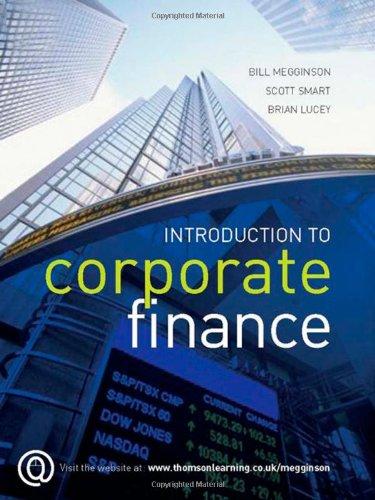Answered step by step
Verified Expert Solution
Question
1 Approved Answer
A merchant trading wheat signs an irrevocable agreement with a wheat farmer to buy 1,000 tons of wheat next season @ USD 200 per ton
- A merchant trading wheat signs an irrevocable agreement with a wheat farmer to buy 1,000 tons of wheat next season @ USD 200 per ton with delivery at his warehouse. He pays an advance of USD 20 per ton to lock in the agreement.
- The above example is of a future trade.
- The above example is of a forward contract.
- With this agreement the merchant has an option to buy 1,000 tons of wheat on the due date but not an obligation.
- None of the above.
- Company A has 1,000,000 outstanding shares, it made $ 1,000,000 in profits and its share price is $ 10.
- Company As market capitalization cannot be ascertained from the above statement but price earning (PE) ratio can be ascertained.
- Company As PE ratio can be ascertained but not its market capitalization.
- Neither market capitalization nor PE multiple of Company A can be ascertained from above statement.
- Both PE multiple and market capitalization can be ascertained by above statement.
- Eric started a computer shop investing $20,000 of his money. Of this $10,000 is his equity portion and $ 10,000 he has extended as loan to business.
- Assets side of the balance sheet of computer shops balance sheet shows an entry of a credit of $20,000 as cash.
- The liability of the balance sheet shows $ 30,000. $10,000 being loan he extended to the business and cash of $ 20,000 credited in bank.
- The liability side of balance sheet shows $10,000 as debts the company owes to Eric and $10,000 as Erics equity in computer shop
- Statements (i), (ii) and (iii) are all true.
- Statements (i) and (ii) are true.
- Statements (ii) and (iii) are true.
- Statements (i) and (iii) are true.
- How do insurance companies make profits when they have to pay out huge amount whenever insurance claim is laid?
- Insurance companies dont usually honor the claim.
- Misfortunes are random and rare, insurance companies can make money by collecting premiums from a large number of clients even when they may have to pay out every once in a while.
- Insurance companies often have complex contracts with exclusions that limit their risks further.
- Statement (i) is true.
- Statements (i) and (ii) are true.
- Statements (i) and (iii) are correct.
- Statements (ii) and (iii) are correct.
- Bank A surrenders its USD funds that are due next month to Bank B in exchange of banks Bs RMB funds due next month instead. Interest rate on USD is 3% p.a. whereas interest rate on RMB is 6%. The above transaction is an example of:
- Interest Rate Swap.
- Currency Swap.
- Forward contract.
- Future.
Step by Step Solution
There are 3 Steps involved in it
Step: 1

Get Instant Access to Expert-Tailored Solutions
See step-by-step solutions with expert insights and AI powered tools for academic success
Step: 2

Step: 3

Ace Your Homework with AI
Get the answers you need in no time with our AI-driven, step-by-step assistance
Get Started


